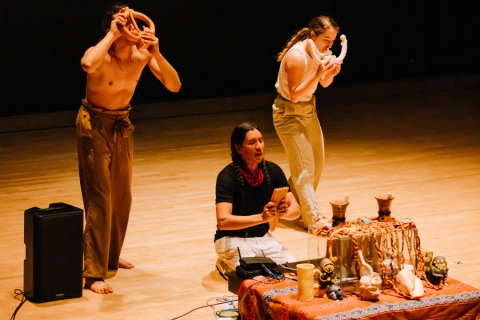Reclaiming Sound
Doctoral students Fabricio Cavero and Reed Wixson blend sustainability and sound
By Diana Kalaji
In 2024, the Department of Music’s Ph.D. program in Integrated Composition, Improvisation and Technology (ICIT) celebrated 15 years of innovation and community. ICIT pushes beyond traditional boundaries of classical composition, computer music, improvisation and jazz, encouraging students to create new works and technologies.
Doctoral students and Medici Scholars Fabricio Cavero and Reed Wixson embody the program’s ethos, weaving sustainability into their compositions. The Medici Scholarship, awarded to promising young artists and scholars, provides financial support and mentorship to help students focus on specific projects while expanding their creative development.
Cavero crafts instruments from clay, honoring pre-colonial intellect and his Andean ancestry. Wixson draws from nature’s soundscapes, from flowing water to the stillness of the Mojave Desert, exploring humanity’s connection to the environment beyond guilt or fear. Both artists invite audiences to experience music as a space for reflection, offering fresh perspectives on our relationship with the Earth.
Cultural Resonance
Fabricio Cavero’s path to music began at a guitar recital in Peru when he was 15. Though he did not come from a musical background, the performance ignited him to become a musician. He set aside his dream of becoming a doctor, picked up the guitar and later explored the violin. While his family was initially wary of the sudden shift from biology to music, they eventually recognized his dedication. During his time in Cusco, Cavero credits violin mentor Amy Tai, a Bostonian, for encouraging him to pursue his art form academically.
“Working with clay allows you to learn the language of Earth and water."
“She emphasized, if this is your dream, you must do it right, get organized and get disciplined,” said Cavero.
His progress grew alongside his family’s support, leading him to a yearlong intensive in Lima. There, he deepened his understanding of academic music while exploring how the violin naturally complemented Andean traditions. Cavero went on to earn a bachelor’s degree from Texas Christian University (TCU) and a master’s from Southern Methodist University. At TCU, an orchestra grant solidified him as a composer — a turning point in his musical evolution.
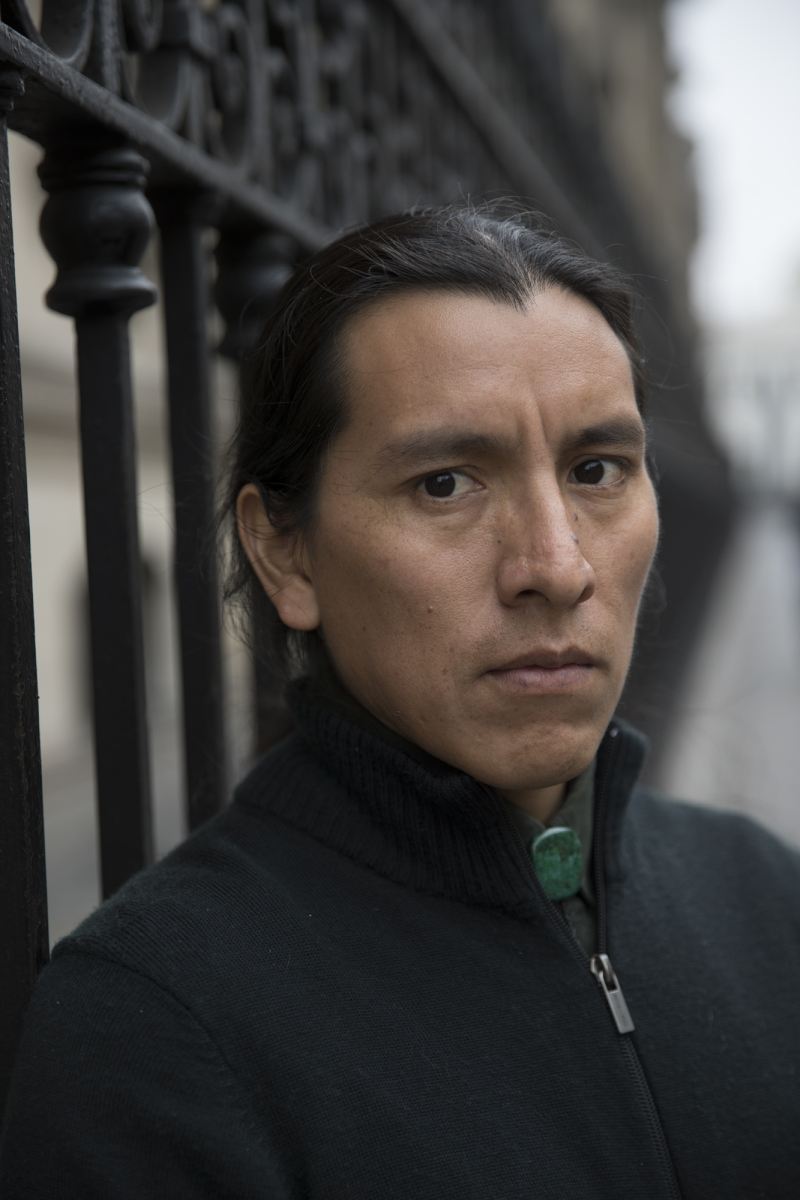 After nearly a decade away from home, Cavero felt the pull to reconnect with his roots. Teaching in public and private schools in Peru, he found clarity in his purpose.
After nearly a decade away from home, Cavero felt the pull to reconnect with his roots. Teaching in public and private schools in Peru, he found clarity in his purpose.
“I realized the necessity to express my experiences through the music, instruments and legacy of my ancestors,” said Cavero.
Cavero’s dissertation examines how music technology serves as a synthesis of culture, embodying both personal identity and a broader historical narrative. For him and his Andean roots, instruments are vessels of cultural expression, intellect and sustainability.
“The beauty of music technology is that it has several dimensions,” he said. “In pre-Columbian instruments, they were considered entities. They aren’t objects that make sound — they have faces, spirits and a life force of their own.”
Central to Cavero’s sustainable approach is crafting instruments from clay. Beyond reducing environmental impact, this practice reconnects him to precolonial traditions.
“Working with clay allows you to learn the language of Earth and water,” said Cavero.
From helmet flutes to palm flutes, his work explores the ecological implications of music technologies. His dissertation acknowledges the complexities of using electronic devices while offering alternatives that emphasize environmental responsibility.
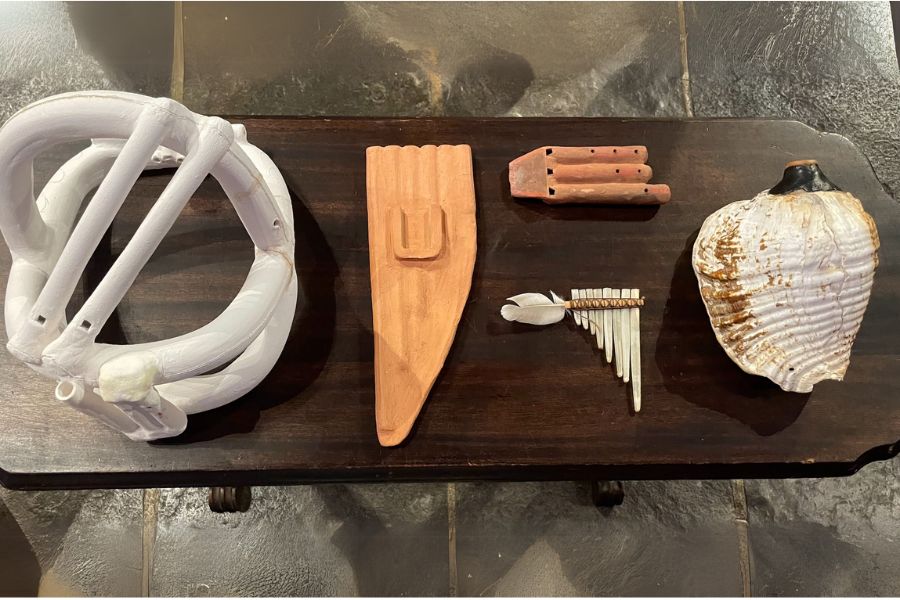
Image: (left to right) Helmet flute, clay pan flute designed to hold a motion sensor, replica of a Mayan triple flute, feathers pan flute, pututu (conch shell in Quechua).
“I want to encourage people to become integral artists that can understand and question theory, teach, perform and make their instruments with a sustainable framework,” said Cavero.
By raising awareness of technology’s ecological and social footprint, Cavero hopes to inspire a generation of integral artists through a sustainability lens.
Cavero’s work is driven by a desire to create meaningful experiences. His handmade instruments may seem unfamiliar to audiences, but they invite listeners to engage with a deeper narrative of connection. Rooted in Western musical traditions yet interwoven with his Indigenous heritage, his compositions explore how ancient and modern technologies can coexist, reflecting the evolving human experience amid a rapidly changing environment.
“As an artist and a composer, I think about what I am saying,” said Cavero. “Right now, I want to communicate coexistence.”
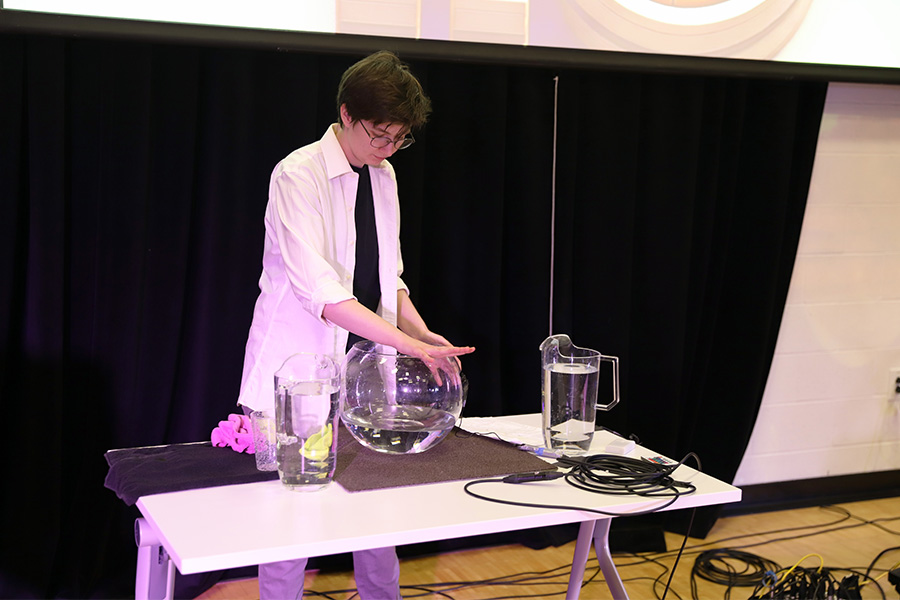
Image: Reed Wixson performing with fishbowls and feedback at the ICIT 15 anniversary celebration. Photo by Jaime DeJong.
Earth’s Echoes
Reed Wixson is a forager of sound. At 11 years old in Arkansas, they spent hours outside their home near a creek and greenbelt, making up songs and absorbing the sounds of their surroundings.
“For me, being interested in ecologically minded compositions wasn’t developed — it’s something that was always there,” said Wixson.
Rooted in a classical music background, Wixson began composing at 13 with aspirations of songwriting and film scoring. Their creative practice expanded as an undergraduate at Texas Tech, where improvisation and technology inspired new artistic directions. It was during their master’s program in composition at Stony Brook University that Wixson ventured into field recordings, exploring how music extends beyond notes on a page into the textures of the natural world.
"It’s about finding the value in things that have already lived a life."
Sustainability is a constant consideration in their work, even when it presents challenges. Wixson acknowledges the inherent contradictions — using technology and electricity while striving for ecological mindfulness — but embraces the tension as part of the creative process.
“I am interested in reusing materials,” said Wixson. “It’s about finding the value in things that have already lived a life.”
Their materials are as diverse as their soundscapes — ranging from the ripples of water in a fishbowl to feedback from desiccated trees at the Burns Piñon Ridge Reserve in the Mojave Desert. With UC Irvine student Oliver George-Brown, Wixson collected timber from the reserve and modulated feedback through the wood itself, playing it from a transducer speaker to evoke otherworldly sounds. Ethical collecting is central to their practice; they take only what is needed, always mindful of the environment. This approach reflects a lifelong relationship with nature, where curiosity and respect coexist.
“When I’m thinking about ecology, I’m thinking about systems and networks beyond the binary divide of nature,” said Wixson.
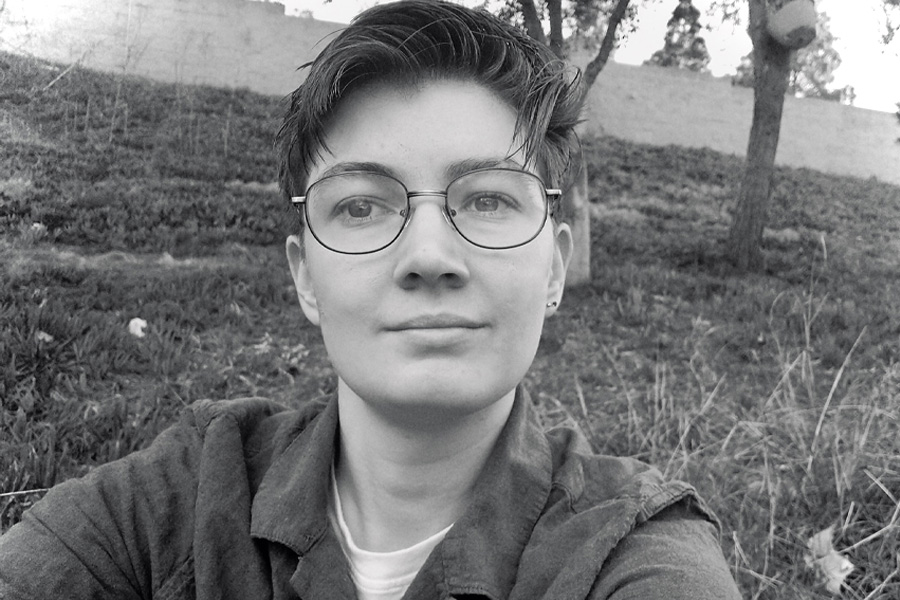
Image: Reed Wixson
As climate anxiety grows, Wixson recognizes that many feel overwhelmed and hopeless. Yet through their art, they offer another way forward — one that engages the body and senses. Site-specific performances and reclaimed materials are ways for Wixson to challenge the separation between humans and the environment, fostering a renewed connection.
“Sustainability practices in art can open us up and help us process and mourn,” said Wixson. “The reality is there is much to grieve and reflect on. Creating spaces to celebrate what we still have — music can be a powerful vehicle for that.”
To learn more about ICIT, visit music.arts.uci.edu/icit. For more information about the Medici Scholarship Program, visit arts.uci.edu/medici-circle.
Please visit our secure direct giving page and make a gift to support CTSA today!

